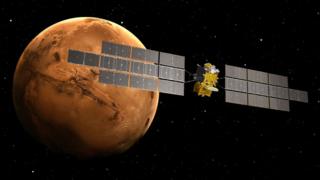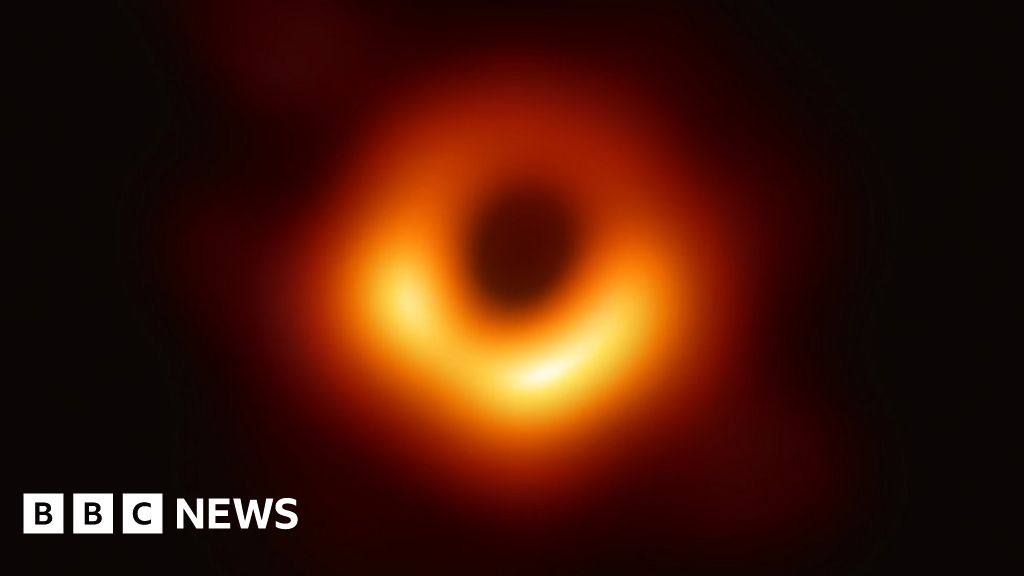 Image copyright
AIRBUS
Image caption
Artwork: The Earth Return Orbiter will weigh over six tonnes and have a 39m solar wingspan
Image copyright
AIRBUS
Image caption
Artwork: The Earth Return Orbiter will weigh over six tonnes and have a 39m solar wingspan
Airbus-France will build the huge satellite that brings the first Martian rock samples back to Earth.
This material will be drilled on the Red Planet by the US space agency's next rover, Perseverance, before being blasted into orbit by a rocket.
It'll be the Airbus satellite's job to grab the packaged samples and then ship them home.
The joint American-European project is expected to cost billions and take just over a decade to implement.
But scientists say it's probably the best way to confirm whether life has ever existed on the Red Planet.
Any evidence is likely to be controversial and will need the powerful analytical tools only found in Earth laboratories to convince the doubters, the researchers argue.
An illustrated guide to Mars Sample Return
How will Nasa and Esa bring rocks from Mars to Earth? Click here
"This is not just twice as difficult as any typical Mars mission; it's twice squared - when you think about the complexity involved," said Dr David Parker, the director of human and robotic exploration at the European Space Agency (Esa).
"And this satellite that Airbus will build - I like to call it 'the first interplanetary cargo ship', because that's what it will be doing. It's designed to carry cargo between Mars and Earth," he told BBC News.
Dr Parker announced the European aerospace company's role in the Earth Return Orbiter (ERO) at a Nasa-Esa briefing with reporters just ahead of Thursday's launch of the Perseverance robot.
The Airbus satellite will be a Goliath among spacecraft.
ERO will weigh 6.5 tonnes at launch in 2026 and use a mix of chemical and electric propulsion to get to Mars, orbit the planet and then return to Earth with its rock consignment. Thales Alenia Space of Italy will be a lead subcontractor working on this aspect of the design.
The inclusion of a powerful ion engine will require a lot power, hence the use of immense solar arrays. These panels will give the satellite a "wingspan" of 39m, more than 120ft.
But the really remarkable facet of the satellite's mission is the game of catch it will have to play high above Mars.
Image copyright Kees Veenenbos / space4case.com Image caption Artwork: Did Mars ever host life? The evidence could be held in the planet's rocksNasa will put a rocket on the planet later this decade to fire the rocks collected by Perseverance into orbit.
The Airbus spacecraft will have to manoeuvre itself into a position to capture these samples that will be packaged inside a football-sized container.
After ingesting this container, the satellite must then prepare it for return to Earth.
This means not only shipping it across hundred of millions of km of space, but also putting the football inside a re-entry capsule that can be dropped into Earth's atmosphere to land in an American desert.
"People have talked about Mars Sample Return for years. I remember working on it myself as far back as 2002. But we're now in the exciting situation where we're about to do it. This dream is about to become a reality," Dr Parker said.
Esa still has to work through the final contract details with Airbus for the satellite. Signatures are expected in September.
Dirk Hoke, the CEO of Airbus Defence and Space, said the satellite would leverage all the expertise the company had gained down the decades.
"Airbus Defence and Space is excited to take on this challenge as part of this joint international mission," he said.
"As a selected prime for the Mars Sample Return's Earth Return Orbiter, we're bringing the full force of our experience gained on Rosetta, Mars Express, Venus Express, Gaia, ATV, BepiColombo, and JUICE to ensure this mission succeeds. Bringing samples back to Earth from Mars will be an extraordinary feat, taking interplanetary science to a new level," he told BBC News.
It all starts with Perseverance.
The six-wheeled American rover is due to launch from Cape Canaveral in Florida during a two-hour window that opens at 07:50 local time (12:50 BST; 11:50 GMT) on Thursday.
Perseverance is being targeted at a 40km-wide bowl on Mars called Jezero Crater. Orbital imagery suggests it contained lake water billions of years ago.
Scientists say there's every chance the rocks that formed at the edge of this lake retained the chemical traces of past biology - if ever it existed.
Esa estimates its contribution to the Mars Sample Return project will be about €1.5bn ($1.7bn; £1.4bn) over 10 years. Nasa's contribution will likely lift the total budget for all parties to in excess of $7bn (£5.6bn; €6bn).
Jonathan.Amos-INTERNET@bbc.co.uk and follow me on Twitter: @BBCAmos

 5 years ago
1039
5 years ago
1039 

